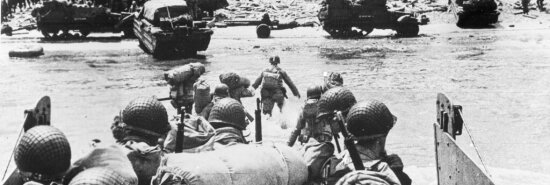
D-Day is about the heroism of finishing a fight
Timothy P. Carney
Video Embed
Mark D-Day on a timeline, and then mark today. The near mid-point of that line would be Ronald Reagan’s famous 1984 speech at Normandy — it was the 40th anniversary of D-Day, and it was 39 years ago today.
With the veterans of D-Day before him, the Army Rangers who helped win that day, Reagan delivered some of his most famous lines, and they deserve a close read.
ANOTHER STEP TO BECOMING THE PARENT PARTY
“These are the boys of Pointe du Hoc,” Reagan began, and the crowd applauded. But Reagan had just begun climbing a rhetorical mountain. “These are the men who took the cliffs. These are the champions who helped free a continent.” Notice how he was steadily elevating his descriptor of the Rangers, from boys, to men, to champions. Then Reagan scaled to the rhetorical peak: “These are the heroes who helped end a war.”
What made these men heroes was that they helped end a war.
A good country fights wars only because it has to. A good general’s goal is to end the war. General William Tecumseh Sherman knew this perfectly and said it again and again.
“War is Hell,” Sherman famously said. “War is all destruction.”
Sherman saw in 1864 what Gen. Dwight Eisenhower saw 80 years later: his job was to end a terrible, terrible war that the enemy had started. Sherman marched his men past their supply lines, to the sea, to cut off the Confederate Army, which is what it took to end the war.
The heroes of Pointe du Hoc and the rest of the Allied army ended the European war by May 1945. Then President Harry Truman set out to end the war in the Pacific through unprecedented means: Deliberately killing hundreds of thousands of Japanese civilians.
Because ending a war is good, Truman was aiming at good ends. His means, I believe, were totally inappropriate.
Other endings of American wars were ugly or bumpy in other ways. Nixon withdrew from Vietnam, which was the right thing to do, but was inevitably ugly.
President George H.W. Bush ended the Gulf War without really ending it — he left Saddam Hussein in power, which years later helped lead to his son’s launching the disastrous Iraq War, which ended in failure for the U.S.
President Donald Trump ran on promising to withdraw from Afghanistan. Trump’s first steps in that direction actually involved increasing troop levels, which was probably prudent. But there was no clean way to end the 20-year-old war in Afghanistan, and Trump never did it.
CLICK HERE TO READ MORE FROM THE WASHINGTON EXAMINER
Biden withdrew from Afghanistan in August of his first year, reflecting that he knew it would be spectacularly ugly. He also, it seems, did it in a totally inept way.
D-Day is a moment to remember the heroism of ending a war. Sadly, the victory in Europe won by those boys of Pointe Du Hoc might be the last time the U.S. has ended a war in a heroic way.
